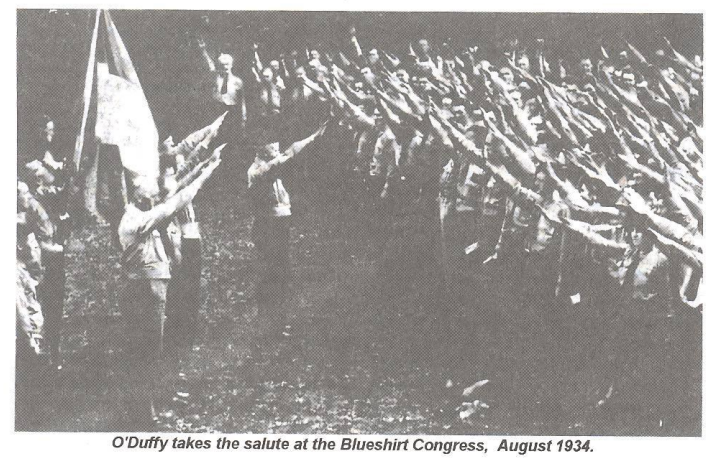A new leader, Eoin O’Duffy, was appointed in 1933 after he had been sacked from his post as Police Commissioner. O’Duffy had been prominent in the Free State army during the Civil War and had been responsible for the murder of eight Republicans by tying them together over a landmine in Kerry. The Blueshirts used the handy label of “anti-communism” as a cloak for their fascist activities. This excuse was used to justify the breaking up of republican and socialist meetings. James Hogan claimed that:
“It was the growing menace of the Communist IRA that called forth the Blueshirts as Communist Anarchy called forth the Blackshirts in Italy”.
[…]
The organisation of the battle against the Blueshirts was carried out by the left wing rank and file of the IRA, the tiny Communist Party of Ireland and a number of radical trade unionists. Urban workers and rural small farmers were mobilised to physically break up Blueshirt meetings and rallies throughout the country. The police and the army were used to break up anti-fascist protests and on many occasions the demonstrators had to face bullets, baton charges and bayonets as well as the Blueshirts themselves.
Interestingly:
In 1936 O’Duffy resurrected the Blueshirts into a 700 strong Irish Brigade to fight for Franco in Spain. […] The demoralised Blueshirts voted to return home after only a few months of the fight for Christianity. Brendan Behan quipped that they were the only army in history to return from war with more soldiers than they left with. Despite their pathetic performance the returning “heroes” received a civic reception in Dublin. After his disastrous intervention in the Spanish Civil War O’Duffy offered to recruit Irish volunteers to fight for Hitler in Europe but the Nazis showed no interest in his suggestion.
[Further reading]
Blackshirts, Blueshirts, and the Spanish Civil War
Catholicising Fascism, Fascistising Catholicism? The Blueshirts and the Jesuits in 1930s Ireland
Eoin O’Duffy’s Blueshirts and the Abyssinian Crisis
Blueshirts, Sports and Socials
The Blueshirts and the ‘Economic War’: A Study of Ireland in the Context of Dependency Theory
“Helping the Guards”: Illegal Displays and Blueshirt Criminality, 1932–36
The Blueshirt Movement, 1932–5: Ireland’s Fascists?
The socio-economic background and membership of the Blueshirt movement, 1932–5
Maurice Manning’s The Blueshirts


